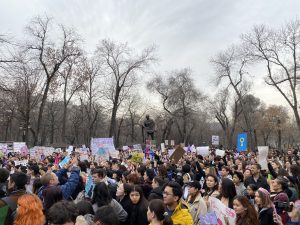The Almaty city administration ultimately allowed a number of feminist organizations to hold a rally within Gandhi Park, outside the core of Kazakhstan’s most populous city, for International Women’s Day on March 8, after months of bans and protests.
According to the authorities, the demonstration would have to be confined within the park and could not gather more than 300 people. While the organizers respected the former request, despite having lobbied until the last minute for holding a march across the city, they could not stop residents from joining, and more than 700 gathered for the two-hour event.
As usual, the presence of police and secret service officers in plain clothes was visible, especially given the colorful outfits that activists and attendees wore with pride.
“The ‘other’ rally of the ‘men in black’ around us is surely more boring,” Valeriya Ibrayeva, an art curator in her 60s and a regular at March 8 rallies, said.
Similarly to last year, a wide range of feminist organizations had to struggle to reach an agreement with the authorities, which denied the possibility to hold a march. Last year, the city administration said there was road work and allowed a rally within the square in front of the Academy of Sciences instead.
This year, the pretext for denying a march was more blurry . The authorities ultimately confined the rally to Gandhi Park, a less central location, because the Academy of Sciences square had been booked by a so-called League of Volunteers.
In 2021, more than 500 people gathered and marched along Shevchenko street between these two locations, an urban demonstration allowed for the first time after years of denials, fines, and arrests.
This year, activists demanded the adoption of a law against harassment that would give certainty of punishment against the perpetrators. In addition, some organizations stressed the need to take measures to shrink the pay gap between men and women.
Despite a large, varied attendance, little was said about LGBTQ rights, which have been a target of nationalist, conservative groups in the past. A sign explicitly chastising sex work acted as a reminder that more conversations about women’s rights would be beneficial for the feminist debate within the country.
While being focused on International Women’s Day, the rally also featured a speech by feminist and LGBTQ activist Zhanar Sekerbayeva, who is running for a seat in Almaty’s local council in the March 19 legislative elections.
Several other candidates from the various districts of Almaty attended the rally and campaigned.
Feminist topics are not prominent in the campaign for the upcoming elections, although more conservative candidates have tried to disrupt Sekerbayeva’s campaign by taking down or covering her promotional posters. In the last week of the campaign, several candidates have lamented being subject to pressure.
In sending his congratulations for International Women’s Day, President Kassym-Jomart Tokayev stressed “the role of humankind’s beautiful half in the family, in the life of society, in the development of the state.”
While slipping on traditional patriarchal tropes, Tokayev also added: “The government will always strive to ensure gender equality, protect women’s rights, and strengthen family values.”
Family values remain key in Kazakhstan’s traditional society, and feminist activist have struggled to separate their role as women from their decisions to become wives or mothers.
The dismissal of any feminist discourse so far denotes a minimization of the movement, which has grown in numbers and in consciousness in the past few years, as also demonstrated by yearly feminist festivals organized throughout Central Asia.
In the capital, Astana, authorities said they would allow a feminist march, but on April 8. Activists are awaiting confirmation in order to understand the rationale for the postponement.
Should it be allowed to march on, the feminist movement could push for more equality and bring positive change in Kazakhstan’s legislation and in society at large. For now, the authorities have decided to surround activists with “men in black” and confine them to a small square.

































